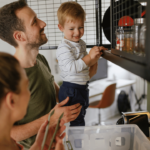
Dealing with Childhood Anxiety: Effective Strategies for Support
Childhood anxiety is a common mental health challenge that affects one in five children. While some worry is normal, chronic anxiety can be detrimental to a child’s well-being. It is important for parents to understand that protecting their child from fears can actually make anxiety worse. Instead, parents should help their children learn to tolerate anxiety and function despite it. This will ultimately help to decrease anxiety over time. Validating a child’s fears and expressing confidence in their ability to manage anxiety can be helpful. It is also important to encourage children to talk about their feelings and ask open-ended questions to avoid feeding the cycle of anxiety.
Key Takeaways:
- Childhood anxiety affects one in five children.
- Protecting children from fears can worsen anxiety.
- Validating a child’s fears and expressing confidence in their ability to manage anxiety can be helpful.
- Encouraging children to talk about their feelings and ask open-ended questions can prevent the cycle of anxiety.
- Learning to tolerate anxiety and function despite it can help decrease anxiety over time. Dealing with Childhood Anxiety
Understanding Childhood Anxiety and its Causes
Anxiety in children is a common and natural response to the uncertainties of life. However, for some children, this anxiety becomes overwhelming and persistent, impacting their daily functioning and well-being. It is important for parents, caregivers, and teachers to understand the underlying causes of childhood anxiety in order to provide effective support and intervention.
Anxiety in Children: The Fear of the Unknown
Children with anxiety often have a heightened fear of the future and the unpredictability it brings. This fear, although normal to some extent, can become amplified and long-lasting for children with anxiety disorders. They may constantly worry about what could happen, be excessively cautious, or struggle with significant anxiety in anticipation of upcoming events or situations.
Contributing Factors
Childhood anxiety can have various causes, including genetic predispositions and environmental stressors. Research shows that children with a family history of anxiety disorders are more likely to develop anxiety themselves. Additionally, stressful life events such as divorce, moving, or trauma can trigger or exacerbate anxiety symptoms in children.
Recognizing the Signs
Parents, caregivers, and teachers should be vigilant in identifying signs of anxiety in children. Physical symptoms such as headaches, stomachaches, or sleep disturbances can be indicative of anxiety. Children with anxiety may also exhibit avoidance behavior, refusing to participate in certain activities or situations that trigger their anxiety. They may seek excessive reassurance and validation, constantly seeking comfort and reassurance from trusted adults.
Early Identification and Intervention
Early identification and intervention are crucial for managing childhood anxiety effectively. Recognizing the signs and seeking appropriate support can help children build resilience and develop coping skills. By addressing anxiety early on, parents and caregivers can empower children to navigate their fears and anxieties with confidence.
| Anxiety Symptoms in Children | Description |
|---|---|
| Physical Symptoms | Headaches, stomachaches, sleep disturbances |
| Avoidance Behavior | Refusing to participate in certain activities or situations that trigger anxiety |
| Excessive Reassurance-Seeking | Constantly seeking comfort and reassurance from trusted adults |
By keeping an eye out for these signs and taking appropriate action, parents and caregivers can provide essential support to anxious children, helping them develop healthy coping strategies and ultimately thrive.
Recognizing the Signs of Anxiety in Children
Anxiety in children can present differently depending on their age. It is essential for parents to be aware of the signs and symptoms so they can provide the necessary support and intervention.
Signs of Anxiety in Young Children:
Young children may struggle to articulate their worries verbally, but they may display behavioral and physical signs of anxiety. These can include:
- Irritability: Increased crankiness and fussiness
- Physical symptoms: Stomachaches, headaches, or other unexplained physical complaints
- Sleep disturbances: Difficulty falling asleep or staying asleep
- Social withdrawal: Avoidance of social activities or difficulty separating from parents
Signs of Anxiety in Older Children:
Older children are generally more adept at expressing their anxiety compared to younger children. However, they may still exhibit signs such as:
- Irritability: Mood swings, irritability, and anger
- Physical symptoms: Frequent headaches, stomachaches, and other unexplained physical ailments
- Trouble concentrating: Difficulty focusing on tasks, schoolwork, or other activities
- Changes in behavior: Increased avoidance of situations or activities, changes in eating or sleeping patterns
Recognizing Anxiety-Related Behavioral Changes:
Parents should be vigilant for any changes in a child’s behavior and overall functioning. These changes could indicate the presence of anxiety and may require professional assistance. Some of the behavioral changes parents should look out for include:
- Academic decline: Sudden drop in academic performance or increased school-related anxiety
- Social withdrawal: Avoidance of social interactions and difficulty making friends
- Excessive worries: Constantly expressing concerns and seeking reassurance
- Changes in appetite: Noticeable changes in eating habits, including increased or decreased appetite
“Recognizing the signs of anxiety in children is the first step towards providing them with the necessary support and intervention.”
It is crucial for parents to create an open and supportive environment where children feel comfortable expressing their worries. Encouraging open communication and active listening can help children feel understood and validated. Recognizing the signs of anxiety and taking appropriate action can lead to early intervention and effective strategies for managing childhood anxiety.
Effective Strategies for Helping Children with Anxiety
When it comes to supporting children with anxiety, it is essential to strike a balance between validating their fears and encouraging them to face their fears. Parents should never dismiss a child’s worries, even if they seem irrational. Instead, they should validate the child’s feelings and offer reassurance.
One effective strategy is to help children relax before attempting to reason with them. Deep breathing exercises can help calm their minds and bodies, making it easier for them to process their anxiety. Encouraging regular relaxation techniques can provide a sense of calmness and control.
“Acknowledging my child’s feelings and giving them space to express themselves has made a significant difference in managing their anxiety. No worry is too small or silly to be acknowledged.”
Another valuable approach is helping children develop coping mechanisms to manage their anxiety. Teaching them simple strategies like deep breathing, positive self-talk, and mindfulness can empower them to confront their fears and regain control over their emotions.
Parents should also assist children in creating a gradual exposure plan to face their fears. Exposure therapy is an evidence-based technique in which children are exposed to their fears in a safe and controlled manner. This process helps them confront their anxiety gradually and build resilience over time.
Practical Tips for Helping Kids with Anxiety:
- Validate their feelings and provide reassurance
- Teach relaxation techniques like deep breathing
- Encourage positive self-talk and mindfulness
- Develop a gradual exposure plan to face fears
Remember, every child’s journey with anxiety is unique, and what works for one child may not work for another. By understanding their fears, offering support, and equipping them with coping strategies, parents can play a crucial role in helping their children effectively cope with anxiety.
Seeking Professional Help for Childhood Anxiety
While many children can manage their anxiety with the support of their parents, some may require professional help. If a child’s anxiety is impairing their daily functioning, such as frequent school absences or avoidance of social activities, it may be time to seek help from a mental health professional. Therapy, either alone or in combination with medication, can be effective in treating childhood anxiety. It is important for parents to prioritize their child’s mental health and seek appropriate care when needed.
Childhood anxiety treatment is a specialized area that requires the expertise of professionals trained in working with children. These professionals, such as child psychologists or psychiatrists, have the knowledge and experience to assess and diagnose childhood anxiety disorders. They can develop tailored treatment plans that address the specific needs of each child.
Benefits of Seeking Professional Help
- Specialized expertise: Mental health professionals who specialize in childhood anxiety have the training and knowledge to provide effective treatment.
- Accurate diagnosis: Professionals can conduct thorough assessments to accurately diagnose and understand the child’s anxiety symptoms.
- Individualized treatment: Treatment plans are tailored to the child’s unique needs, utilizing evidence-based approaches and strategies.
- Support for parents: Professionals can educate and support parents in understanding and managing their child’s anxiety.
- Collaboration with other professionals: If necessary, mental health professionals can collaborate with other healthcare providers, such as pediatricians or school counselors, to ensure comprehensive care for the child.
Seeking professional help for childhood anxiety is a proactive step in ensuring the well-being of your child. It is not a sign of weakness or failure as a parent, but rather a commitment to providing the best possible care for your child’s mental health.
“Early intervention is key in managing childhood anxiety effectively. Seeking professional help can equip parents with the tools and strategies they need to support their child and promote their overall well-being.” – Dr. Sarah Johnson, Child Psychologist
Comparison of Different Childhood Anxiety Treatment Approaches
| Treatment Approach | Description | Pros | Cons |
|---|---|---|---|
| Cognitive Behavioral Therapy (CBT) | A therapeutic approach that focuses on identifying and changing negative thought patterns and behaviors associated with anxiety. |
|
|
| Medication | In some cases, medication may be prescribed to manage severe anxiety symptoms. |
|
|
| Family Therapy | A therapeutic approach that involves the whole family, aiming to improve communication and reduce anxiety-related conflicts. |
|
|
Conclusion
Dealing with childhood anxiety is a complex process that requires patience, understanding, and support from parents, caregivers, and teachers. It is crucial to validate a child’s fears and create a safe and supportive environment for them to navigate their anxiety. By implementing anxiety reduction techniques for kids, parents can empower their children to develop healthy coping mechanisms.
A key aspect is helping children relax and gradually exposing them to their fears. The use of deep breathing exercises and relaxation techniques can be effective in calming anxious children. Additionally, parents should encourage open communication and provide a listening ear to support their child’s emotional well-being.
However, it is important to seek professional help if a child’s anxiety is significantly impacting their daily functioning. Mental health professionals experienced in coping with anxiety in children can provide tailored strategies and therapies to address the specific needs of each child. Remember, supporting anxious children is a collaborative effort, and what works for one child may not work for another.
In conclusion, by understanding and managing childhood anxiety, parents can help their children develop resilience and the skills to cope with anxiety throughout their lives. With the right support and resources, children can thrive and navigate their world with confidence and well-being.
Frequently Asked Questions
What is childhood anxiety?
Childhood anxiety is a common mental health challenge that affects one in five children. It is an excessive and prolonged worry or fear that can impact a child’s well-being.
How can parents help children with anxiety?
Parents can help children with anxiety by validating their fears, expressing confidence in their ability to manage anxiety, and encouraging them to talk about their feelings. They can also teach relaxation techniques and gradually expose children to their fears.
What are the signs of anxiety in children?
Signs of anxiety in children may include physical symptoms such as headaches and stomachaches, avoidance of certain situations, and the need for excessive reassurance. Changes in behavior and functioning can also indicate anxiety.
Can anxiety in children be treated?
Yes, anxiety in children can be treated. Some children may manage their anxiety with parental support, while others may require professional help. Therapy and, in some cases, medication can be effective in treating childhood anxiety.
When should I seek professional help for my child’s anxiety?
If your child’s anxiety is impairing their daily functioning, such as frequent school absences or avoidance of social activities, it may be time to seek help from a mental health professional.
What should parents do if their child’s anxiety doesn’t improve?
If a child’s anxiety doesn’t improve with parental support and coping strategies, seeking professional help is recommended. A mental health professional can provide additional guidance and support.













